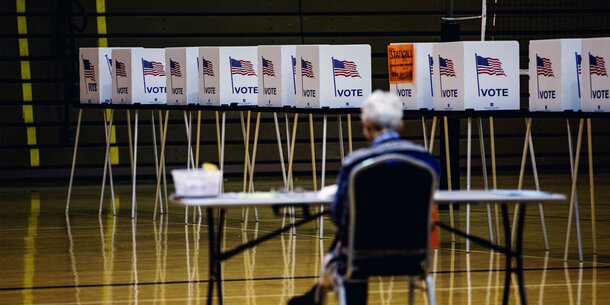Last spring, in the weeks and months after life was first reshaped by the coronavirus pandemic, local governments stepped up to help save the 2020 election. Knowing that many voters might not want to risk their health by casting a ballot in person, cities like Philadelphia, Milwaukee, Houston, and Miami expanded access to mail voting by sending absentee ballots or ballot applications to all registered voters, sometimes with pre-paid postage, and by providing ballot drop boxes, among other moves.
I suggested at the time that Republican-leaning rural counties in the same states might follow suit, in order to ensure that rural voters would enjoy the same expanded access as urban ones. A race to the top, in other words.
I should have known that was too optimistic. After an election in which both mail voting and overall turnout soared, several GOP-led states, as we know, are desperate to restrict voting. And as part of that effort, they’re looking to clamp down on local governments’ authority to make voting easier — or in some cases, to run elections at all.
Two states have already done so. Among the most dangerous parts of the sweeping voter suppression law Georgia passed last month is a provision that allows the state election board to suspend and temporarily replace local election officials. In practice, that means the state board — which, thanks to a different part of the law, will have a majority of members appointed by the GOP-controlled legislature — will be able to oust any local election official who seeks to expand access to the polls in ways the state doesn’t like. That could prevent county officials from taking individual on-the-ground conditions into account in order to devise election plans that best serve their voters. One part of the restrictive voting law Iowa passed last month could have a similar effect, making it a felony for local election officials not to follow guidance from the secretary of state. And a bill in Arkansas would likewise allow the state election commission to take over local election boards under certain circumstances — it failed once in committee but can be brought up again.
Then there are the efforts either to prevent local officials from taking certain steps to expand access, or to require them to impose restrictions. Bills in Texas, Wisconsin, and other states would bar local governments from sending absentee ballot applications to voters who haven’t requested one, and Iowa’s law does the same. Arizona and Wisconsin are among the states with bills to ban mailing absentee ballots to anyone who hasn’t requested one. The Texas measure goes beyond mail voting, outlawing the 24-hour and drive-thru polling sites that were a hit with voters after some urban counties in the state introduced them last year. It also would allow the state to force local governments to purge the voter rolls — something a Missouri voter ID bill would do too.
Notably, this assault on the power of local governments to set election rules comes at a time when many of the same states are also setting out more broadly to undermine local democracy, as it increasingly becomes a site for progressive policy advances. In recent years, states have banned cities and counties from taking a range of steps like raising the minimum wage, requiring businesses to provide sick days, outlawing anti-LGBT discrimination, and banning fracking. Often, these “preemption” laws have been intended to reverse progressive local reforms that were passed thru grassroots organizing efforts — as when Milwaukee-based advocates for public health and low-wage workers mobilized to pass a paid-sick-day ballot measure, only for Wisconsin to approve a preemption law that nullified it.
In all of these efforts, it’s hard to avoid the racial angle. The attempts to crack down on local election boards come after heavily African American cities like Philadelphia, Detroit, and Atlanta were targeted with false fraud allegations by President Trump and his supporters. One conservative Georgia pundit recently made clear which local officials his state’s law is aimed at reining in. “Fulton County has been rife with fraud for as long as I can remember,” he said, referring to the state’s most important Democratic-leaning county, where Atlanta is located. “And yes, there is a mechanism in place to take over when a local board of election system fails.”
Many preemption laws, too, have seemed designed to disempower Black voters and their representatives. To take one notorious example, just weeks after Birmingham, Alabama, approved a minimum wage hike that would have benefited low-income, predominantly African-American fast-food workers, all-white Republican majorities in the state legislature took it away by banning local governments from raising wages.
The same dynamic exists in Michigan’s use of its Emergency Manager law over the last decade, through which the state has taken over local governments in heavily Black cities in order to more tightly control public spending. In Flint, this led to thousands of kids being exposed to lead in their drinking water, after the city switched its water source during a budget crisis. You saw it, also, in the spate of state takeovers of local Black-run school boards during the 1980s and 1990s, which came after minority communities began winning court rulings that guaranteed equal resources.
One takeaway from all this: It underscores how many of these seemingly separate dynamics — voter suppression, especially the kind that aims to roll back local reforms; state-level preemption; and even gerrymandering, which has encouraged extremism by removing the need for many state lawmakers to reach out beyond their base — are in fact serving the same overarching goal: to degrade and undermine democracy at all levels, out of a fear that it won’t produce the right outcomes. Even as we fight back against the latest tactics, we should keep that larger strategy in mind.
The views expressed are the author’s own and not necessarily those of the Brennan Center.



